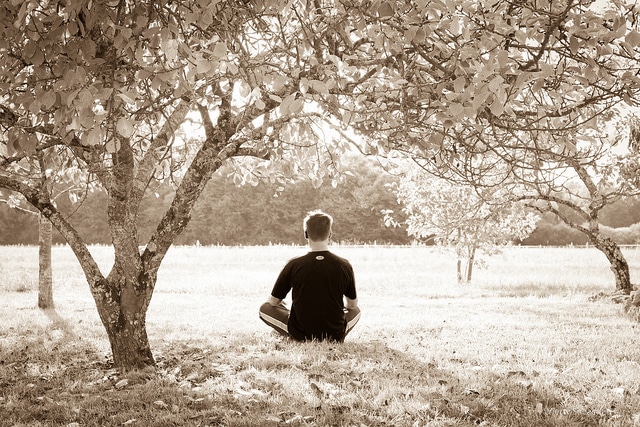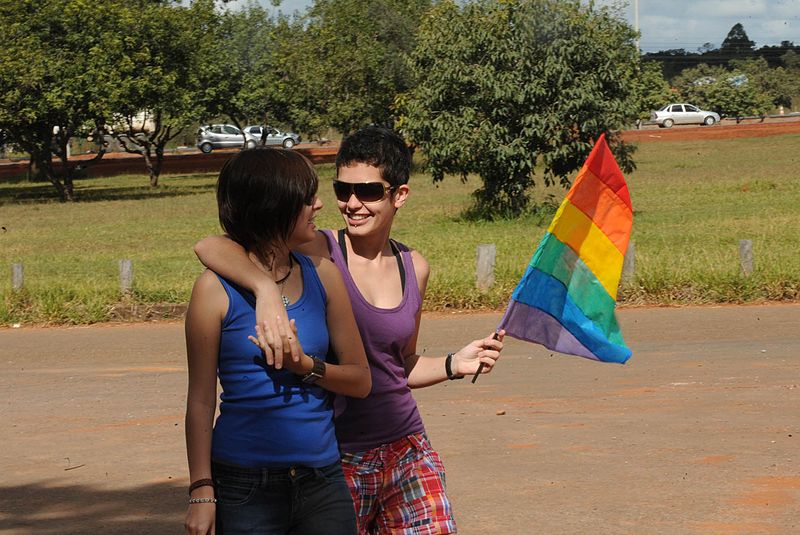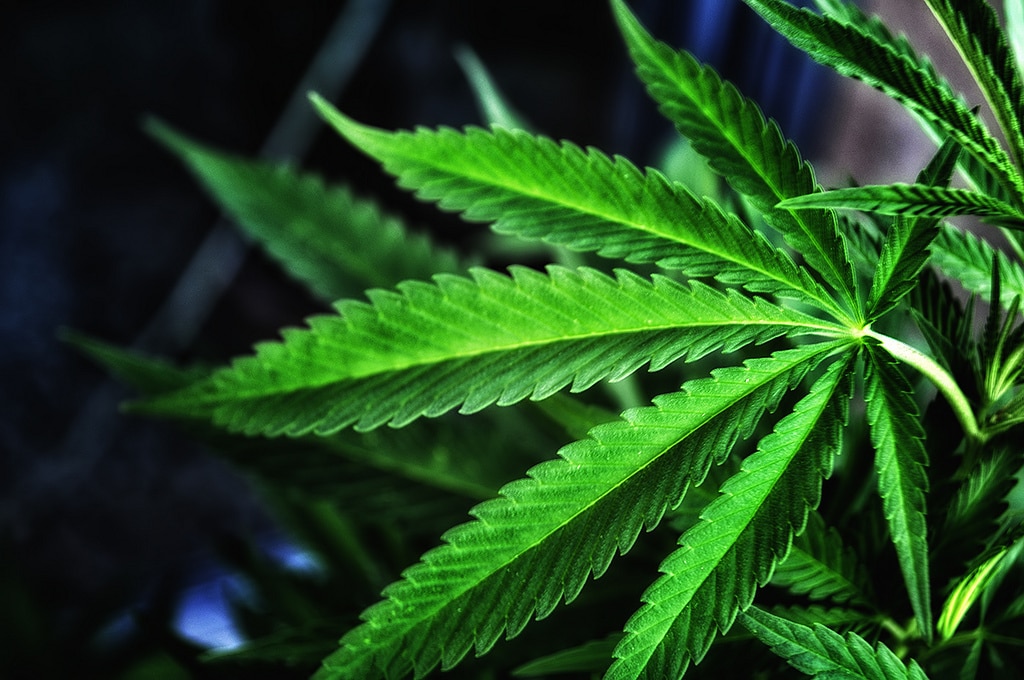
To transform personal realizations from a psychedelic experience into long-lasting change, an ongoing integration practice can support psychological and spiritual growth. | Flickr CC user Sebastien Wiertz
The first time I ate psilocybin mushrooms, I was eighteen years old, walking around a public art museum. I had no idea what psychedelic integration was, let alone what psychedelics could do for my personal development and spirituality. My experimenting came from sheer intrigue and excitement, and because someone offered it to me. So all of the feelings, thoughts, and revelations that brewed up during my afternoon museum visit never really get processed. I went on with my days, feeling completely different without really understanding why or even how.
More than a decade later, I realize that taking the time to follow up and explore the thoughts and feelings that surface during a psychedelic experience is the only way to fully integrate any insight you might have gained into your day-to-day life. Otherwise, those revelations slip away in the distracted frenzy of modern life. I’ve since learned integration practices like meditation, journaling, and yoga, that made these revelations transformative in a really concrete way. A lot of research and literature backs my experiences up—that if you’re looking to use psychedelics as a tool for personal growth or self-realization, the step that happens after a psychedelic experience, called integration, is arguably the most important part.
What Psychedelics Can and Can’t Do for Self-Realization
During a psychedelic experience, many people have intimate realizations about themselves, their relationships, and their bad patterns or habits. The word “realization” sounds incredibly internal and low-impact compared to what a psychedelic experience actually can be, which researchers liken to a major, life-changing event. One study on psilocybin and depression reported that over 70% of the study participants reported the experience as being one of the five most important in their life. Another psilocybin study from John Hopkins reported that nearly 60% of participants became more open in their personality, which lasted up to a year.
When you take a psychedelic, a profound spiritual experience—while not a given—is always possible. But if you’re looking for true growth and spiritual development, a lot of people agree that the work to fully gain the benefits from those realizations starts after you’ve come down.
In his 2011 book, Psychedelic Healing: The Promise of Entheogens for Psychotherapy and Spiritual Development, psychedelic writer and researcher Neil Goldsmith writes that psychedelics don’t provide personal growth or spiritual enlightenment “in a pill” and that meaningful transformation takes discipline:
“Since psychedelics generally do not effect ‘cures,’ gains in psychological peace and spiritual maturity must be maintained with support of an ongoing practice. For certain needs or areas of focus, this practice might be psychotherapy; for others, spiritual practices might be employed. Adopting [either] is both an aid to and a sign of change, and the associated psycho-spiritual worldview that emerges has been correlated with improved and maintained health.”
Any person who’s recovered from trauma, addiction, or depression knows that healing yourself is a process, not an overnight cure. To borrow a sentiment from a Billie Holiday song, “The difficult I’ll do right now, the impossible will take a little while.” Luckily, there are a lot of tools that can help make the “impossible” visible at the end of the path.
Practices to Integrate a Psychedelic Experience
There’s a lot of variety in the practices you can use to effectively integrate a psychedelic experience. While I’ve included a sampling of some of the tools most touted by practitioners, integration should ultimately be tailored to each person’s unique needs and personality.
Meditation
Some spiritual practices mentioned in Psychedelic Healing include yoga, meditation, chanting, and prayer, and Goldsmith explains that the meditative state evoked by these practices can quiet our minds and help us see what we really want out of life:
“When we are in touch with our true underlying self, when we have breathed deeply, relaxed, and released the knots in our psychological ‘muscle’ and are just being ourselves, then our will emerges. At that state of mind, what we really want naturally emerges.”
You can think of meditation as a tool for observing your thoughts and reactions to things, and for uncovering your true nature. While there are lots of meditations to choose from—some specifically designed to cope with anxiety, depression, or trauma—it’s easiest to start by just sitting quietly with yourself.
Sit on the floor on a pillow (or in a chair, if that’s more comfortable), set a timer for five minutes, and start to notice your breath. If any thoughts come—and they will—acknowledge them and try to let them go. Keep a steady breath for the duration of the five minutes, noticing aches or pains that may come, or any strong feelings, but always try to let them go. Once you feel comfortable sitting and breathing for five minutes, increase your time to 10 minutes and then 15 minutes. It might take several days or weeks before you feel comfortable sitting for even 5 minutes, so be patient with yourself.
Since psychedelics make you more open to new experiences, meditation only assures you stay steady on this path and continue to discover more on your journey. In his 1982 study, psychiatrist Roger Walsh interviewed five people about their psychedelic experiences and tracked their progress onwards. Some practiced mental disciplines such as meditation, during which they came to new realizations about their psychedelic experience years after it happened! Meditation is essentially one path to new discoveries among many others.
Journaling
Journaling can be a helpful exercise both during or immediately after a psychedelic experience. As one contributor to an article on integration shared, “Writing things down, even in sentence fragments or bits of descriptions of visions, has been a really important way for me to remember insights that I got from trips that reverberate with me to this day.”
If you’re uncertain about how to begin, start by asking yourself, “What do I remember most vividly?” and work from there. Channel your inner Joyce and Faulkner and write in a stream-of-conscious style for as long as you have something to say, or you can give yourself a set time or number of pages to write. You may not know what to say—if you’re still stuck, you can write “I’m not writing anything” or “This is stupid!” if you have to! Just keep writing. Like with meditation, try to let go of whatever thoughts or words you’ve put on paper; you can return to it later to make sense of the meaning.
Even after you’ve scribbled down your initial thoughts or ideas from the experience, writing and journaling can be a helpful way to continue to integrate those realizations into your life. Maybe you picked up on a symbol during your experience that keeps coming up in your daily life. Or maybe you want to keep expanding on the entry you wrote the day before. Perhaps you read about other experiences online and draw connections or parallels.
Whatever you write, if you find that writing has been helpful, don’t stop—make it a daily ritual. Many people have credited important breakthroughs to free-writing exercises like author Julia Cameron’s “morning pages,” a practice that instructs you to fill up three pages every morning with whatever comes to mind, no matter how banal. Writing exercises like this work in a fashion similar to a meditation practice, allowing you to dump your noisy, nagging, cyclical thoughts in a figurative trash can and get to the important stuff underneath.
Spiritual Counsel and Body Work
Sometimes our psychedelic experiences can be too intense and overwhelming to process just through individual practice.
If you feel that talking to someone about your experience would be helpful, reach out for therapy or spiritual counsel. It’s important to find someone who won’t shame you for deciding to use psychedelics, but spiritual counsel can really take whatever form feels most comfortable to you—you can talk to a trusted religious figure in your life or to a friend or mentor. If you’ve participated in a ceremony with a shaman, go to them with any questions, strong feelings, fears, or concerns that may have arisen during your experience. In my personal experience with ayahuasca, shamans will perform healing practices that include chanting and working with essential oils for someone who’s had a difficult experience.
If you’re interested in doing body or energy work that uses a holistic approach (meaning it takes the health and well-being of a person as a balance between body, mind, and soul), visit a local acupuncture clinic, reiki practitioner, or attend a spiritually-minded yoga class. If you want help processing negative energies from a bad experience, there are psychics who offer energy work to help people integrate a psychedelic experience. If you seek spiritual counsel or body work from someone, bring any possibly helpful insights or questions that have cropped up during meditation or writing practices to make the most of any conversation or session.
You can also visit this MAPS article for a more comprehensive list of resources for psychedelic integration that can help you with a difficult experience or enhance your spiritual development practices.
The Importance of Integration
Philosopher, meditation practitioner, and Eastern philosophy advocate Alan Watts is famous for saying of psychedelics, “Once you get the message, hang up the telephone.” Psychedelics can provide you profound and important understanding, yes, but that they can only take you so far toward any interpersonal understanding (and can be dangerous if you go too far). It’s after you hang up the psychedelic “telephone” that the real work of personal and spiritual development begins.









